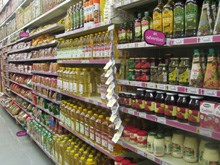
Top stories






More news

Marketing & Media
Warner Bros. was “nice to have” but not at any price, says Netflix

Logistics & Transport
Maersk reroutes sailings around Africa amid Red Sea constraints

















Jan Potgieter, Game's MD, said that the company had decided to add products such as maize, rice and sugar to its existing selection of confectionery, beverage, baby food, pet food, household goods and toiletries. The company's long term strategy is to grow this to 5000 line items in all its stores.
He said the introduction of dry groceries was the natural progression of a strategy that began 18 years ago when it began to stock non-edible groceries such as household cleaning products, toiletries and beauty products. The launch will be a forerunner to the launch of the company's newest food brand, Foodco, into all major stores around the country.
"This brand is a signature full grocery store within a store. We will be not only appealing to loyal shoppers but also to new customers who will become frequent shoppers, making this a grocery shopping destination in its own right," he said.
The first Foodco store opened in Cape Town in 2010. During the financial year to June 2012, the group rolled out this offering in the Western Cape, Gauteng, Mpumalanga and Limpopo as well as Mozambique, Botswana, Zambia and Lesotho. There are now 20 branded stores with plans already in place to expand into the remaining provinces. "We want to develop a national footprint with at least 85 stores by 2016," Potgieter said.
Describing Foodco as a "no frills business," he said that its unique selling point (USP) was value-for-money with the overall basic shopping basket coming in at less than other grocery retailers do. Value, especially when it comes to dry groceries, is passed on to customers via different pack sizes as well as pricing.
He explained that this brand had identified two major differences from the conventional supermarket offering. When it comes to fresh produce and meat, there is no on-site preparation (such as butcheries and bakeries) meaning that everything in store is pre-packed and displayed in a ready-to-sell format. It also offers 'ease of shop', with emphasis on convenience so that busy consumers need to spend less time shopping.
"With narrower, carefully selected ranges and wider, less cluttered aisles, we believe it takes half the time spent in a conventional supermarket to do a basic grocery shop at Foodco. We offer a competitive range - but a leaner, more relevant one. Our strategy is to stock the leading brand in each category and a secondary brand, together with our own branded goods, which will deliver on the value side. We narrow the choice for the consumer, but keep the most likely choices. There should be nothing that you can't get in one of these stores."

The aim was to introduce the brand region by region. Especially when it comes to perishables and fresh produce, product needed to be sourced locally, which meant the company needed to build volumes in particular locations.
As a result, it had opted to launch just dry groceries into stores within areas where a full supplier base was still in the process of being established. He emphasised that, even with dry goods, local producers are used. Where products such as rice are not produced in South Africa, these are packed locally.
Massmart, of which Game is a division and in which international retail giant Walmart has a 51% shareholding, intends expanding sourcing (the majority will come from local manufacturers) to approximately R60 billion of additional food and FMCG purchases. Plans are also underway for the creation of a R100 million supplier fund.
"We intend to leverage Walmart's global expertise in working directly with local farmers to encourage the cultivation of safe, high-quality fresh produce. This will assist existing as well as emerging farmers to deliver consistent fresh produce to our stores while enhancing the net incomes of the local farmers through better operating and logistical practices."
When it comes to consumers, he believes this will impact positively on food prices. "Overall, we will always strive to keep pricing competitive, but we will not compromise when it comes to quality and the trust and confidence of our consumers," he concluded.